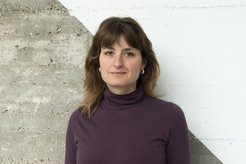"This is us" - Questions for Lou Haux
Our institute has over 300 employees. But that is just a number. Who are the people at our institute? What do they do and what drives them? In our "This is us" format, colleagues answer questions about their work and their motivation.

On the occasion of International Women's Day on March 8, 2023, we started the series “This is us” with 15 female scientists from our institute. We are picking up where we left off and introducing the scientist Lou Haux from Adaptive Rationality. In the last episode we introduced Mengchen Dong from the research area Humans and Machines.
In the research area of adaptive rationality, you are working on risk decision making in chimpanzees, among other things. What fascinates you about this topic?
In my research, I investigate how humans and animals make decisions and what role uncertainties and the associated risk play. I am particularly interested in the evolutionary roots, i.e. where decision patterns come from and how they develop.
What conclusions can be drawn about chimpanzees and humans in terms of their propensity to take risks?
The results of our research show, that the risk propensity of chimpanzees has structural similarities with that of humans. Male chimpanzees are more risk averse than females, risk taking peaks in young adulthood, and stays stable across domains. This suggests that important dimensions of risk taking have evolved independently of the influence of human cultural evolution. These findings help us to better understand the origins of risk taking.
Research with animals, especially chimpanzees is subject to very strict guidelines. How do you source your data and ensure the animals are doing well?
The chimpanzee sanctuaries, where I work in Uganda and Kenya, are part of the Pan African Sanctuary Alliance. The chimpanzees live there in large social groups. I only do noninvasive research, where the animals can decide for themselves if they want to participate in our studies. The studies are always designed as a game at which they can get especially tasty fruits or nuts as a reward.
When did you realize you wanted to go into science and what advice would you give your younger self about starting a career in science?
During my psychology studies in Strasbourg, a course on animal behavioral psychology had piqued my interest. I then did research on social relationships in chimpanzees for my master's thesis at the MPI for Evolutionary Anthropology in Leipzig. The basic question of my research is: What actually makes humans human and chimpanzees chimpanzees and where do any similarities occur. I would advise to my younger self: Follow your curiosity!
What do you appreciate about the Max Planck Community?
The coming together of scientists from all over the world, the interdisciplinary questions and the resulting discussions enable lively scientific work. In addition, the Max Planck Community also makes more complex research possible and supports stays abroad lasting several months.
